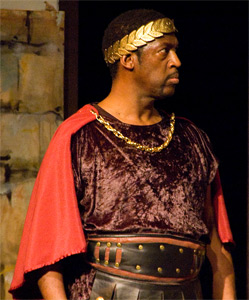|

Review by Elizabeth Warnimon
Special to The Benica Herald
2011
Verismo Opera Company’s mission is to bring affordable opera into communities that might not otherwise be exposed to the genre. The company has met with considerable success since its founding in 1982, building a team of artists, establishing compatible venues, and broadening its audience base.
That success continued in the company’s 2011 season with Vincenzo Bellini’s “Norma,” the tragic story of a Druid high priestess who falls in love with a Roman soldier, which wrapped up its run Friday at the Mira Theatre in Vallejo. An encore showing will be performed in Vacaville on Sept. 11.
Frederick Winthrop, co-founder of Verismo and director-conductor of “Norma,” said one key to the company’s success thus far has been the selection of “war horses,” operas that are well known and have been consistently popular. Previous productions include Verdi’s “La Traviata” and “Rigoletto,” and Bizet’s “Carmen.”
In “Norma,” the Roman army is advancing on Gaul. The people are anxious to arm themselves in resistance, but their high priestess has been urging peace, waiting a call from their god, Irminsul, to determine when to take action.
Despite her vow of chastity, Norma (performed Friday by Teressa Byrne) has borne children by her Roman lover Pollione (portrayed Friday by Tenor, ). When Pollione announces that he has taken another lover, Adalgisa (played Friday by soprano Shelly Welch), Norma announces that it is finally time for the Gauls to take up arms.
Torn between conflicting passions for her trusted companion Adalgisa, her own illegitimate children, and the man she still loves, Norma finally offers herself as the sacrificial martyr as dictated by religious protocol. Pollione, moved by her noble act, ultimately accompanies her to their mutual doom.
“Norma” is not as widely recognized as Verismo’s previous selections; what distinguishes the work is its stark representation of the bel canto opera style, a departure from tradition that focused primarily on the improvisational abilities of the soloists. It serves as a fine example of a fundamental opera style, which may be one rationale for Verismo’s decision to produce it, but it is also a very technically challenging work for the singers, making it an unlikely choice for a fledgling company whose primary aim is to attract new audiences.
Verismo appears to be on a roll. Audiences can feel the excitement and enthusiasm that comes across in the music as well as the acting. Last Friday’s audience reflected that enthusiasm with extended, rousing applause. It is clear why dedicated fans continue to come back for more.
|

